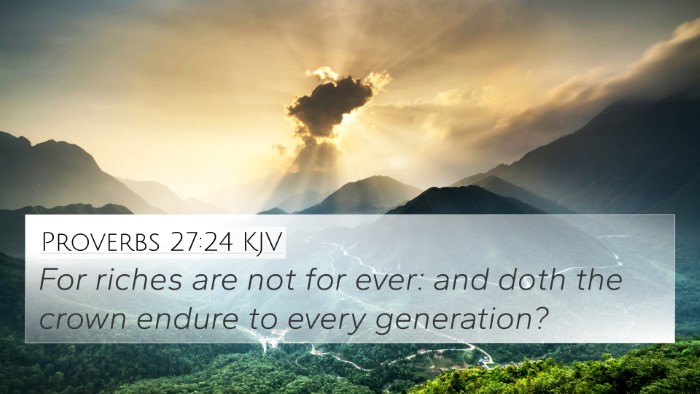Understanding 1 Timothy 6:17
1 Timothy 6:17 states, "Charge them that are rich in this world, that they be not high-minded, nor trust in uncertain riches, but in the living God, who giveth us richly all things to enjoy." This verse offers profound insights on the relationship between wealth, trust, and God's providence.
Context and Overview
Paul, in his letters to Timothy, addresses several important themes regarding faith, practice, and community living within the Church. In 1 Timothy 6, he particularly emphasizes the attitude of believers toward wealth and material possessions.
Meaning and Significance
The directive to the wealthy in this verse can be understood through several significant points:
- Wealth and Humility: Believers who are financially prosperous are cautioned against pride and self-reliance on their riches. High-mindedness leads to spiritual complacency.
- Uncertain Riches: The phrase "uncertain riches" highlights a key understanding: temporal wealth can be fleeting and unreliable. This reflects Proverbs 23:5, which teaches about the transient nature of riches.
- Trust in God: Instead of relying on material wealth, believers are encouraged to place their trust in God, who is the source of all good gifts (James 1:17).
- Enjoyment through God: God's provision is presented as generous and meant for enjoyment, urging believers to appreciate and responsibly use their resources.
Cross-References and Related Scripture Verses
The following Bible verses relate closely to 1 Timothy 6:17, illuminating its themes of wealth, humility, and trust in God:
- Proverbs 11:28: "He who trusts in his riches will fall, but the righteous will flourish like foliage."
- Matthew 6:19-21: "Do not lay up for yourselves treasures on earth... but lay up for yourselves treasures in heaven."
- 1 Peter 5:5: "God resists the proud, but gives grace to the humble."
- Luke 12:15: "Take heed and beware of covetousness, for one's life does not consist in the abundance of the things he possesses."
- James 4:13-14: "Come now, you who say, 'Today or tomorrow we will go to such and such a city...'" This reflects the uncertainties of life and riches.
- Philippians 4:19: "And my God shall supply all your needs according to His riches in glory by Christ Jesus."
- Hebrews 13:5: "Let your conduct be without covetousness; be content with such things as you have." This verse emphasizes contentment and trust.
Key Themes and Life Applications
The teachings within 1 Timothy 6:17 can lead to practical applications in the lives of believers:
- Generosity: The wealthy are encouraged to be generous and use their resources to serve others, reflecting Christ's love and provision.
- Spiritual Investment: Focus on building spiritual wealth rather than solely accumulating material possessions leads to eternal rewards.
- Coping with Riches: A balanced view of wealth helps in maintaining a humble spirit and avoiding the pitfalls of greed and materialism.
Comparative Bible Verse Analysis
Understanding 1 Timothy 6:17 in context with other Biblical teachings provides deeper insights:
-
Correlating with Matthew 19:24: Jesus teaches about the difficulty for a rich person to enter the kingdom of heaven, echoing the themes of dependency and trust in God rather than wealth.
-
Echoes in Old Testament Wisdom: The book of Ecclesiastes frequently addresses the futility of wealth without purpose, aligning with Paul's admonitions in Timothy.
Tools for Bible Cross-Referencing
For those looking to explore Bible verse connections deeper, consider utilizing these tools:
- Bible Concordance: Helps locate specific words in the Bible and find related verses.
- Bible Cross-Reference Guides: Provide cross-references for themes and topics within the scriptures.
- Cross-Reference Bible Study Methods: Techniques for examining related scriptures for more profound comprehension.
Conclusion
1 Timothy 6:17 serves as a rich reminder for believers about the proper attitude towards wealth. It encourages humility, trust in God's provision, and a generous spirit, ultimately reshaping how one engages with worldly riches.


























